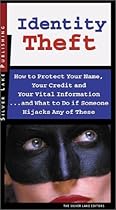A new breed of ID-thief wants to heist your home (literally), because they know it's likely your most valuable asset. Here's how to keep the swindlers from wrecking your home ownership.
by Broderick Perkins
© 2008 DeadlineNews.Com
More ID theft news that really hits home.
Deadline Newsroom - A growing number of crooks who steal your identity don't swipe your personal information to pilfer from your financial accounts.
They want to get their hands on your home and snatch it right out from under you.
Modern day malefactors are mindful of the fact that while you may have quite a stash to swipe from your savings, credit and investment accounts, chances are your home is your most valuable asset.
You can, however, protect your home from a heist by taking measured preventative steps.
The Federal Bureau of Investigations recently reported the new scourge of "house stealing", a marriage between mortgage fraud and identity theft (ID theft), both of which are now staples of organized criminal activity.
Here's the basic house stealing scam:
• A grifter chooses a house and assumes the identity of the homeowner, often using the Internet to obtain personal information. The information is used to create fake identification papers.
• The culprit then transfers the deed into his or her name using forged documents, signatures and fake identification, but by filing the paperwork with the proper authorities. Now they "own" the home.
• In one variation, the house thief steals the home and then sells it to pocket the profits -- even if someone still lives there. In another variation, crooks prey on homeowners in financial trouble. They promise to refinance the mortgage, but instead "buy" the home using fake identities.
Sai Huda, CEO of San Diego, CA-based Compliance Coach recently deployed CompliancePal the first-of-its kind software clients use to meet federal requirements to weed out ID theft "red flags" -- indicators that identity filching could be afoot.
Huda said the software has found other variations on the house stealing scheme including a team posing as both the owner selling the property and the buyer making the purchase. The real homeowner is left in the lurch.
He developed the software to help federally regulated institutions comply with the so-called "Red Flag" provision of the Fair and Accurate Credit Transactions Act of 2003 (FACTA). Fully effective in November this year, the provision requires that financial institutions, creditors and others who handle your personal identifying documents develop and deploy an ID theft prevention program.
The federal provision comes with more than two dozen red flags regulated companies must heed.
"If businesses fail to comply it's not only civil monetary penalties, it's also violations of federal and state unfair and deceptive acts laws. It's a serious risk for Realtors, mortgage brokers, lenders and others who don't comply," Huda said.
But Huda's software has found nearly as many additional red flags beyond the federal regulations and he says that indicates consumers also have their work cut out for them.
"Consumers need to ask, 'Who am I doing business with? What are they doing to protect me? What am I doing to protect myself?' " he added.
To prevent someone from stealing your home, take conventional ID-theft prevention measures with a focus on protecting your home's ownership.
• Review your credit report frequently. You can do so three times a year for free at the one and only federally-sanctioned AnnualCreditReport.com by getting one report, in turn, every four months from each of the three major credit reporting agencies -- Equifax, Experian and Transunion. Avoid sound-alike services.
• "Just as you keep tabs on your credit report, keep a watch once or twice a year on your home's title records," says Huda. You don't need to hire a title company for a title search, but it's a smart move to visit your county recorder or other public recording agency to check your title for lien changes or additions, requests for information or other anomalies.
• Question all real estate professionals who work on your home transaction about their experience, how they handle your private information and check their license or certification status for complaints or other issues.
• Invest in a confetti shredder to destroy identifying documents before tossing them. Better yet, rub out the paper trail and move financial transactions online. Conduct as much digital banking as possible. The online account gives you 24 hour access to inspect your accounts as often as you wish.
• When you are away, put a stop on all mail and deliveries rather than have someone pick them up.
• Use a safe or safety deposit box for any important documents paperwork you must retain.
© 2008 DeadlineNews.Com
Get news that really hits home for your Web site or blog from DeadlineNews.Com.
Broderick Perkins, an award-winning consumer journalist of 30 years, is publisher and executive editor of San Jose, CA-based DeadlineNews.Com, a real estate news and consulting service, and the new Deadline Newsroom, DeadlineNews.Com's new backshop. In both cases, it's where all the news really hits home.
DeadlineNews.Com's Editorial Content Is Intellectual Property • Unauthorized Use Is A Federal Crime
Thursday, May 22, 2008
ID Theft Hits Home
From The
Deadline Newsroom
on
5/22/2008 10:00:00 AM
![]()
Labels: Broderick Perkins, credit report, Deadline Newsroom, DeadlineNews.Com, fraud, house stealing, ID theft, mortgage fraud, online banking, red flags
Subscribe to:
Post Comments (Atom)


No comments:
Post a Comment